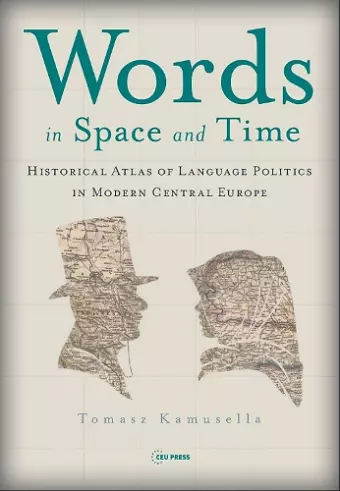Words in Space and Time
A Historical Atlas of Language Politics in Modern Central Europe
Format:Hardback
Publisher:Central European University Press
Published:15th Apr '22
Should be back in stock very soon

With forty-two extensively annotated maps, this atlas offers novel insights into the history and mechanics of how Central Europe’s languages have been made, unmade, and deployed for political action. The innovative combination of linguistics, history, and cartography makes a wealth of hard-to-reach knowledge readily available to both specialist and general readers. It combines information on languages, dialects, alphabets, religions, mass violence, or migrations over an extended period of time.
The story first focuses on Central Europe’s dialect continua, the emergence of states, and the spread of writing technology from the tenth century onward. Most maps concentrate on the last two centuries. The main storyline opens with the emergence of the Western European concept of the nation, in accord with which the ethnolinguistic nation-states of Italy and Germany were founded. In the Central European view, a “proper” nation is none other than the speech community of a single language. The Atlas aspires to help users make the intellectual leap of perceiving languages as products of human history and part of culture. Like states, nations, universities, towns, associations, art, beauty, religions, injustice, or atheism—languages are artefacts invented and shaped by individuals and their groups.
"The author’s grasp of historical events and cultural and political processes is evident on every page, as he provides detailed insights into the political processes of the region that have linguistic relevance: the instalment and use of writing systems, social and religious movements, independence movements, nationalism, the rise of nation states, and many other events, all described in copious yet relevant detail. This is truly an important work and should be used by scholars and students from many fields and for many years to come." http://ahea.pitt.edu/ojs/index.php/ahea/article/viewFile/474/842 -- Anna Fenyvesi * Hungarian Cultural Studies *
"In circumstances, when theory is most eager for the factual side of historical development, the appearance of such books as T. Kamusella’s seems to be of high significance. This review is very much needed, inspiring, and full of new ideas for investigation; it should be a handbook for everyone who is interested in language as a part of cultural, intellectual, national, and/or state history and also in comprehensive and not politically engaged studies." https://doi.org/10.5325/hiperboreea.9.2.0277 -- Liudmyla Novikova * Hiperboreea *
"Kamusella’s atlas can be paraphrased in the words exegi monumentum, as the amount of research, knowledge and information has resulted in a monumental work. The author’s modern, interdisciplinary research approach, combining history, sociology, linguistics, religious studies and cartography, offers new insight into the history and politics of language. The atlas is a recommendable work not only for scholars, researchers of language and the history of the region, but also for those interested in new insights into politolinguistic phenomena in the world. The book undoubtedly inspires reflection on the linguistic politics of the mechanisms of the creation, exclusion and use of Central European languages for political action." http://dx.doi.org/10.11649/ch.2893 -- Izabela Olszewska * Colloquia Humanistica *
"Das Werk bietet kurze, aber präzise Erklärungen zu den behandelten Themenfeldern, die auch aus der Perspektive anderer Fachdisziplinen einen guten Zugang erlauben. Die zahlreichen Karten und die kurzen Kapitel lassen selbst die Verwendung in Schulen als vorstellbar erscheinen. Hierfür sprechen auch das Glossar, die Verfügbarkeit als kostenloses E-Book sowie die präzisen Erläuterungen, die trotz des großen Untersuchungsgebietes neben dem Englischen keine weiteren Sprachkenntnisse voraussetzen. Insgesamt liegt ein lesenswertes Buch und wertvoller historischer Atlas vor, der viele Alternativen zu den bereits bekannten Karten insbesondere für das 20. Jh. bietet. Es ist sowohl für Sprachwissenschaftler und Historiker zu empfehlen als auch für Laien, die ihr Weltbild auf die Probe stellen wollen." -- Grigori Chlesberg * Zeitschrift für Ostmitteleuropa-Forschung *
"Tomasz Kamusella’s Historical Atlas is a remarkable piece of work. It can be read as a critical intervention against what Kamusella sees as the continued propagation of linguistic myths in Central Europe. It can also be used as a detailed accompaniment to research, teaching, or sheer interest in the region. The atlas is the product of extensive work and it is a fantastic read. The lengthy glossary operates as a guide to the maps that are often very detailed. The Historical Atlas will influence seminar teaching. " https://www.h-net.org/reviews/showpdf.php -- James Koranyi * H-Net Reviews *
"A very erudite, highly thought-provoking and pleasingly quirky book, which looks at the region and the history of its language politics from several angles, some of which are quite unusual. Its maps are densely detailed, and well worth spending time studying. Kamusella’s insights are invaluable for making sense of the history of Central Europe." https://journals.sagepub.com/doi/abs/10.1177/02656914231199945k -- Francis King * European History Quarterly *
ISBN: 9789633864173
Dimensions: unknown
Weight: unknown
308 pages
Annotated edition